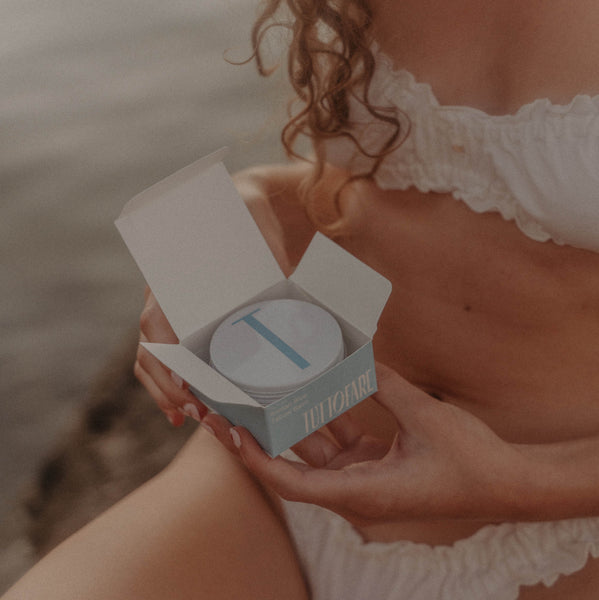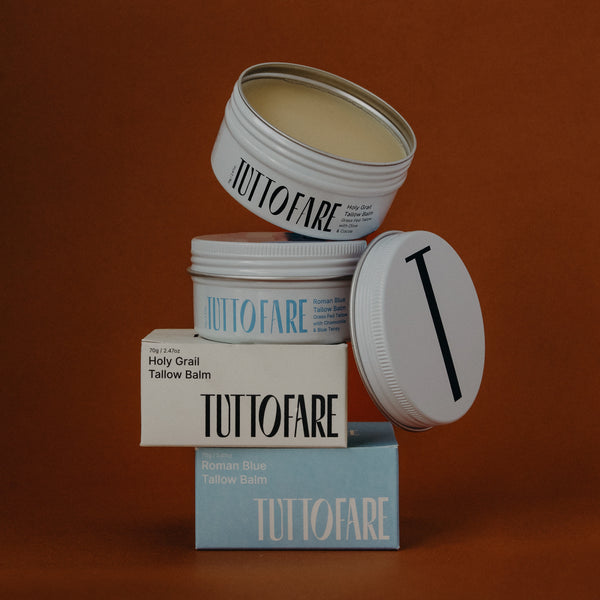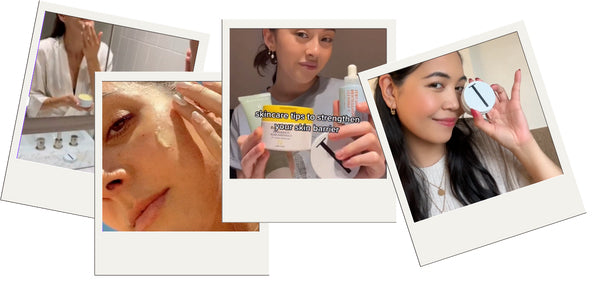

· By Laura Daquino
Beef Tallow Benefits for Skin: 5 Reasons to Use Tallow for Healthy Skin
Over the last 50 years, beef tallow has been widely misunderstood, pushed aside by the rise of synthetic and petrochemical-based skincare. Yet for millennia, cultures around the world have relied on the benefits of beef tallow for skin - using it to protect, heal and nurture the skin.
Beef tallow specifically contains naturally occurring fat soluble vitamins A, D, E, K and B12, plus conjugated linoleic acid and niacin.
Importantly, tallow contains fat-soluble vitamins and their activators which work together harmoniously to improve cell regeneration, fine lines, skin tone, and the appearance of UV-damaged skin.
One of the most powerful benefits of beef tallow for skin is its fatty acid profile, which closely resembles that of our own skin barrier. This can make it highly compatible and deeply hydrating, helping to restore balance to natural oil production while keeping the skin soft, nourished and well-conditioned.
Today, modern science is starting to tell the story of what ancient healers already knew. Tallow can heal, nurture and protect the skin. Tallow has earned its spot in modern day skincare.
Read on to discover the many beef tallow benefits for skin - and how grass-fed tallow can be the key to more youthful, resilient and radiant skin.
Is beef tallow good for skin
Mimicking the fatty acids, vitamins, micronutrients and minerals found in human skin, grass fed tallow is good for your skin. It's balanced and 'skin-identical' composition makes grass fed tallow compatible with different skin types.
It has the ability to closely mimic your skin and improve skin health due to containing healthy fats which closely match our own natural oils. It's especially beneficial for sensitive or dry skin. It keeps skin supple and can help speed up the regeneration of dry and cracked skin. Unlike scented options that incorporate essential oils, which may pose sensitivity issues for customers with very sensitive skin, unscented tallow products are also suitable for the most sensitive skin.

Traditional uses for beef tallow on skin
So, where did it all begin with beef tallow on your skin? In the scheme of history, for centuries, before the introduction of petrochemicals, First Peoples took a holistic approach to natural resources.
If putting beef fat on your face seems a little woowoo, or you think beef tallow on your skin is a new thing, think again. Despite beef tallow's rising status, tallow in fact has a longstanding history across cultures and domains.
Dating back to Roman times, tallow for skin care was a common practice, with the ingredient often used as a sustainable, regenerating skin protectant.
From Ancient Egypt to Ancient Rome, the Inuits in the north, and Indigenous Australians in the south, our wise ancestors would respectfully harness animal fats for skin care, nutrition and cosmetics.
The lowdown on grass fed tallow for skin
As a rendered animal fat, beef tallow has a unique ability where it closely mimics the skin. Applying grass fed tallow on your skin has the potential to reach deeper at a cellular level compared to many plant-based oils.
It is a biomimetic ancient ingredient with a naturally balanced composition of antioxidants, fatty acids, minerals and vitamins.
Beef tallow also contains an abundance of stratum corneum lipids, which are the ceramides, cholesterol and fatty acids contained in the extracellular skin matrix, making it beneficial for skin health.
Tallow from grass fed cows is a nutrient dense fat with high concentrations of naturally occurring non-synthetic compounds. With a molecular structure so similar to skin, 'tallow' even translates to sebum in Latin. Your skin has met its match.
Is tallow safe for skin?
As a semi-occlusive skincare ingredient with emollient properties, beef tallow can be used as a balm, salve, or face and body moisturiser to hydrate, heal and protect the skin.
As a balm or salve, beef tallow can be used to soften skin, help wound healing, and shield against environmental damage. With softening and hydrating properties, you can even use tallow products as lip balm.
Absorbed quickly as a moisturizer, tallow functions like a barrier cream, best used as the last step in a skincare routine or left overnight. As a barrier cream on the skin's surface, tallow may serve the purpose of a makeup primer, as no product applied afterwards will be able to penetrate the skin.
Wondering if beef tallow skin care products are right for your skin? Let's dive deeper into the benefits of grass fed and grass finished beef tallow for skin.

Is tallow good for wrinkles?
Grass fed beef tallow contains Vitamins A, D, E, and K, as well as their activators, to help with fine lines and wrinkles.
Vitamin E in particular plays an important role in delivering anti-ageing benefits. Vitamin E, among other fat-soluble nutrients, is found in much higher concentrations in grass fed and grass finished tallow, as opposed to grain fed tallow.
Tallow from grass fed cows has four times the amount of Vitamin E as grain fed tallow, which helps to repair and reverse free radical damage.
Damage from free radicals may cause collagen levels to deplete, resulting in wrinkles, fine lines and dark spots on aging skin. Adding even just a touch of tallow can help reverse this and boost collagen production. Essentially, reducing free radical exposure (or applying Vitamin E to reverses free radical damage) can be your ticket to younger, healthier looking skin.
Will tallow clog pores?
Purified tallow won't clog pores for most people and has a low comedogenic score. It's a common misconception that tallow will clog pores. In reality, tallow is unique compared to other skincare products, as an emollient with semi-occlusive properties.
While tallow helps to create a protective barrier on your skin that locks in hydration, it doesn't clog pores because of its innate ability to mimic your skin's lipid barrier.
With a rich fatty acid composition, bioavailability of niacin, and naturally occurring vitamins A and E, tallow is effective at working with your sebaceous glands to regulate oil production, support skin barrier function, and influence an anti-inflammatory response.
Beef tallow benefits for skin
1. Tallow's fat-soluble vitamins protect against free radical damage
Containing fat-soluble vitamins A, D, E, and K, as well as their activators, grass fed tallow can help with a range of skin issues, including preventing ageing. Grass fed tallow also contains trace minerals such as selenium, which is used to treat skin conditions and provide protection from free radicals.
Antioxidants provide the essential nutrients to help limit oxidative damage caused by free radicals which are linked to accelerated ageing.
Free radicals are caused by environmental factors including air pollution, UVA and UVB rays, and exposure to toxins from every day inflammatory influences such as smoking, alcohol and sugar. They're impossible to avoid.
Vitamin D, when applied topically, has also been found to protect against phototoxicity and therefore slow signs of ageing in the skin. While further research is required into the benefits of using Vitamin D for skin health, it has a unique relationship with dermatology.
The Vitamin E factor
While tallow's range of vitamins from A through to K help hydrate and nourish the skin, Vitamin E plays a particularly important role. Vitamin E is found in much higher concentrations in grass fed beef, as opposed to grain fed.
With tallow from grass fed cows estimated to have four times the amount of Vitamin E as grain fed tallow, it has a unique ability to protect against free radical damage. (Note: The study cited might even be understating the Vitamin E content of tallow as it doesn't specify the type of grass fed tallow.)
Vitamin E has been scientifically proven to help improve moisture in the skin, prevent damage, and protect skin cells from further damage. As such, it may be applied topically to lighten dark spots and pigmentation, improve the appearance of stretch marks, and help with scarring.
2. Tallow helps sensitive skin to restore skin health
Does tallow help sensitive skin? With conjugated linoleic acid (CLA) and niacin occurring naturally in beef tallow, it has anti-inflammatory properties to help combat types of dermatitis, eczema, rosacea, psoriasis and extreme dryness. If you were looking for the proof, we encourage you to check out real customer reviews.
The high concentration of CLA in grass fed beef tallow skincare may help with redness, irritated skin, cracked skin, and very dry skin. Beef tallow skincare works for sensitive skin, even for our youngest as a baby lotion to help with rashes and irritation.
Sensitive skin types have found relief in using tallow-based skincare to treat a variety of skin conditions.
A well-formulated beef tallow balm may also incorporate other skin protectants such as beeswax to help provide further relief from environmental irritants and soothe irritated skin.
In Australia, approximately 2.5 per cent of the population (about 450,000 people) are affected by psoriasis. Worldwide, it's estimated that 1 in 10 individuals will develop eczema during their lifetime. When it comes to rosacea, it's estimated that more than 5 per cent of the adult population globally is affected.
These conditions are typically defined as chronic inflammation, resulting in extremely dry skin. These figures don't account for other skin conditions such as acute inflammation and dermatitis, which many others experience worldwide, connected to skin allergies, sensitivities and breakouts.
Niacin, the active form of Vitamin B3, is absorbed readily by topical application and has a number of anti-inflammatory benefits in combating skin conditions. It shows promise in treating a range of dermatological conditions, including rosacea, psoriasis, dermatitis, and acne. As well as having antimicrobial properties, niacin is a humectant that can stimulate skin cell growth, wound healing, and the production of collagen.
Adding to this, a study from 2017 showed that CLA has anti-inflammatory properties and may help relieve itchy skin and treat skin disorders. An even more recent study from 2020 showed potential for CLA to aid with skin barrier dysfunction, showing potential to relieve eczema and other skin lesions.
Supercharged skincare with CLA
Outside of beef tallow, CLA is otherwise difficult to find in nature, at least not in stable ingredients. Vegetable oils - including safflower oil, hempseed, rosehip and black cumin seed oils - all have higher levels of polyunsaturated fatty acids (PUFA), which can cause oxidative stress and irritate the skin. Plus, according to a study by USDA's Agricultural Research Center, grass fed cows had 500 per cent greater CLA levels compared to grain fed cows, factory farmed cattle and even cows who foraged.

3. Tallow supports skin barrier function with fatty acids
While research may be limited on the impact of tallow specifically on treating skin conditions, there is evidence that the saturated fatty acids found in high concentrations in tallow may be effective at regulating skin barrier function. Saturated fat can help keep skin hydrated.
Tallow performs the function of a barrier cream, complete with rich essential fatty acids that restore the skin barrier to its healthiest state. As they are naturally found in the skin, essential fatty acids are gentle and biocompatible with your skin when integrated into a skincare routine.
Around 47 per cent of the fatty acid composition of tallow is oleic acid.
Oleic acid is a monounsaturated omega-9 fatty acid. Because of its higher concentration of saturated and monounsaturated fatty acid content, tallow has a unique ability to preserve the effectiveness of more delicate ingredients. This means it helps keep the beneficial nutrients locked in and ferried into your skin, especially from fat-soluble vitamins. The particular fatty acid-profile of tallow means it helps protect the antioxidants from light and oxygen degradation.
Similarly, stearic acid, found across other cosmetics and skincare is naturally occurring in tallow.
Tallow's high stearic acid content helps to repair a damaged skin barrier, improving suppleness of skin. It also keeps skin soft, with stearic acid known for its skin softening properties. It's chalk and cheese with stearic acid when it comes to vegetable fat versus tallow. The cheese wins. (Always.)
Furthermore, grass fed and grass finished tallow contains palmitic and palmitoleic acid.
Around 26 per cent of the fatty acid composition contained in tallow is palmitic acid. This saturated fatty acid is widely used in skin care, often added into the skincare product after the fact. In tallow, palmitic acid occurs naturally.
Palmitic acid is known for its skin soothing properties. Palmitoleic acid has anti aging qualities, further supporting healthy skin.
Palmitic acid retains moisture by forming an occlusive layer, which can help when locking in intense moisture. A study from 2019 found that palmitic acid helps improve the protective barrier function of the skin. This prevents unwanted microbes and pollutants from entering. In nature, it's present in butter, cheese, milk, and meat, as well as cocoa butter, olive oil, soybean oil, and sunflower oil. (At TUTTOFARE, we avoid the latter two ingredients because they aren't as shelf stable as tallow due to their higher polyunsaturated fatty acid content.)
4. Tallow may help with acne and acne scarring
Tallow skincare products may be good for oily skin or acne-prone skin due to a high fatty acid composition, bioavailability of niacin, and naturally occurring fat soluble Vitamins A and E.
Fatty acids not only support skin barrier function, but they may also have anti inflammatory properties. You can use beef tallow for acne scars for this reason.
Tallow contains naturally high levels of fatty acids found to lighten skin pigmentation which may occur in acne-prone skin.
A natural retinol preventing future breakouts?
While studies of topical application in clinical settings are limited, several studies suggest that grass-based diets in animals can help kickstart Vitamin A and E production.
Grass fed tallow may even take a more yellowish appearance from the elevated carotenoid content, which indicates Vitamin A, a precursor to retinol.
Vitamin A is known for helping our skin regeneration which reduces acne and skin irritation. This also helps restore firmness and improve skin elasticity.
Meanwhile, the niacin occurring naturally in grass fed tallow is a powerful antioxidant that can improves the skin's texture and tone. When applied topically, a recent study found that niacin stood up against topical antibiotics for the treatment of moderate acne. Despite the stereotype, tallow is a non-comedogenic ingredient that can be effective at supporting acne-prone skin. Take it from our thousands of happy customers at TUTTOFARE.

5. Tallow is naturally compatible with your skin's lipid barrier
Based on its composition, tallow can mimic human skin. This is why it can work so effectively regardless of skin type. Given the molecular structure of our skin and its synergies with tallow, it may be considered a skin identical, even bioidentical, natural skin care ingredient with so many beneficial nutrients.
Beef tallow skincare performs the function of acting as natural sebum, working with your skin's natural oils, offering just the right amount of skin hydration. It works with your sebaceous glands to lock in moisture in your skin without clogging your pores.
As a semi-occlusive moisturizing cream, applying tallow helps maintain a healthy skin barrier, while doubling as an emollient to penetrate your skin. It does all this without clogging pores.
Essentially, tallow works with your skin, helping keep your skin nourished to bring out the best in your skin.

Lock in your best skin with Tallow Balm
The benefits of beef tallow in a skin care routine are aplenty, importantly, if the beef tallow is sourced and formulated correctly.
At TUTTOFARE, we source the highest quality natural ingredients from Australian farms raising grass fed animals to make our Tallow Balm. Beef tallow skincare here at TUTTOFARE is so much more than rendered beef fat.
As animal lovers, we take a waste-free or 'nose-to-tail' approach when formulating our Tallow Balm, where every part of the animal is honoured and respected in the process. This is skin care, as nature intended.
Healthy animals produce healthy tallow that contains a higher concentration of fat-soluble vitamins, micronutrients, trace minerals and fatty acids in a balanced combination. Considered sourcing and manufacturing, along with the inclusion of other natural, non-toxic ingredients, is what makes a good tallow balm.
During our Tallow Balm manufacturing process, we avoid high heat and harsh chemicals (no deodorising) to ensure our beef Tallow Balm retains its purity.
At TUTTOFARE, we formulate as a tallow balm rather than a tallow face cream, avoiding whipping during the process. This ensures our Tallow Balm doesn't oxidise and keeps shelf stable over time. All of the incredibly healing benefits remain locked in to Tallow Balm, so you can lock and seal the benefits into your skin.
Have you tried beef tallow skin care products yet? At TUTTOFARE, we're known for the Tallow Balm that does it all. It functions as more than a face cream, where you can apply Tallow Balm almost anywhere, from top to toe - from literal cracked heels to cracked lips.
Our famous Tallow Balm can be applied as a face moisturizer, night cream, full body moisturizer, sensitive skin wonder balm, plus, a whole lot more. Shop TUTTOFARE Holy Grail Tallow Balm today.







